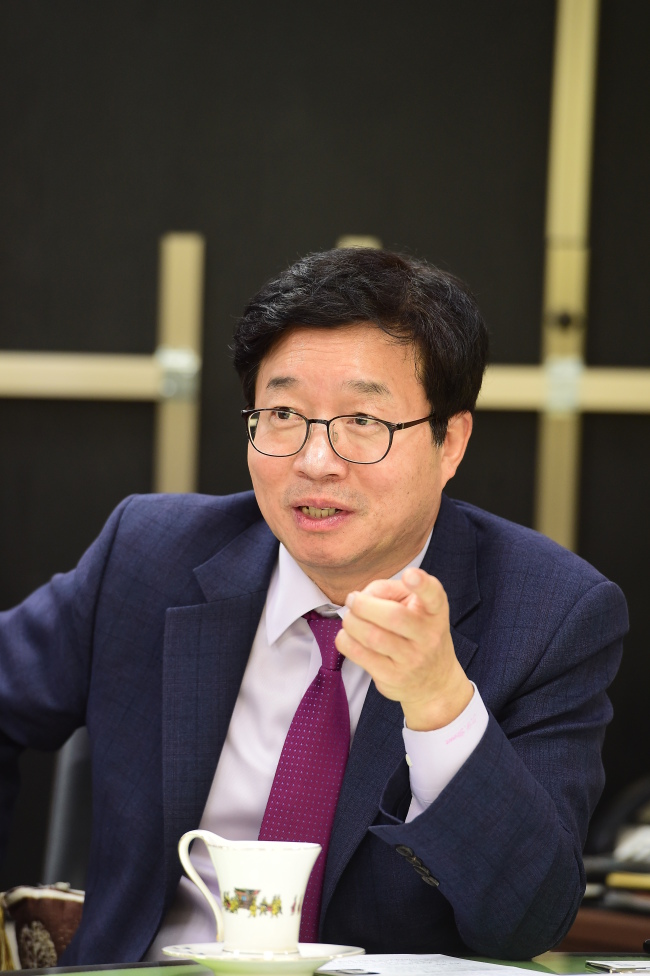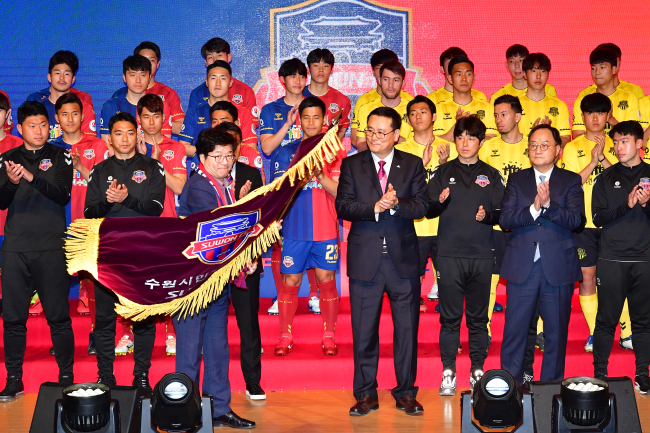Over the past 70 years, Suwon has transformed itself from a small town with about 70,000 inhabitants into a thriving provincial capital with a population of about 1.25 million.
It is not only the capital of South Korea’s most populous province, Gyeonggi, but its largest metropolis too. Now Suwon is embarking on another transformation by seeking greater autonomy through designation as a city with special status.
Suwon Mayor Yeom Tae-young, who was elected in 2010, said Suwon would become a global city where tradition and cutting-edge technology could coexist and where environmentalism and development could be in harmony.
It is not only the capital of South Korea’s most populous province, Gyeonggi, but its largest metropolis too. Now Suwon is embarking on another transformation by seeking greater autonomy through designation as a city with special status.
Suwon Mayor Yeom Tae-young, who was elected in 2010, said Suwon would become a global city where tradition and cutting-edge technology could coexist and where environmentalism and development could be in harmony.

“Suwon special status city will rewrite the history of the country’s local autonomy,” Yeom said during an interview with The Korea Herald, adding that the city would become a guide for other cities seeking the same status.
A special status city, called “teungnye-si” in Korean, is a new status introduced by the Ministry of Public Administration and Security to promote the decentralization of power.
Suwon is one of the four cities that meet the minimum requirement for the status -- a population of 1 million. Yongin and Goyang in Gyeonggi Province and Changwon in South Gyeongsang Province are also candidates.
A special status city remains a municipality, but enjoys autonomy at the provincial level in terms of administration and finance. The four municipalities are eyeing the new status because it will bring in more tax revenue and greater authority to control their own affairs.
Suwon is already competing with other metropolitan cities of similar size -- such as Munich, Germany; Amsterdam, the Netherlands; Dallas, Texas; and Kyoto, Japan.
“The tangible and intangible values of a metropolitan city could be a competitive edge for a country,” he said, stressing that other countries have already begun to foster metropolitan cities as part of state-led projects.
A step closer to direct democracy
In 2019, Suwon celebrates its 70th anniversary as a city.
“I am determined to mark this meaningful year as the year to re-establish Suwon,” Yeom said.
For the former environmental activist, tackling social inequality and realizing grassroots democracy are important ways to achieve that goal.
“We have achieved splendid economic growth for the past century, but the growth is casting shadows in many parts of our society,” he said. “We should now take a step toward embracing ordinary people’s lives -- democracy in daily lives.”
To have democracy firmly take root in the people’s daily lives, he says, it is vital for him to win his campaign pledge and have Suwon declared a special status city.
“When the city becomes a special status city, complex administrative procedures can be simplified and the quality of public services will increase,” he said. “We can secure the foundation of administration and finance for the size of Suwon so that we can more intensively and rapidly push for projects to create jobs, support local merchants, draw investment from companies and establish social infrastructure.”
The standards for social welfare will also be readjusted to those of a metropolitan city, which would help Suwon eliminate its blind spots, he said.
In his view, it is the people who should ultimately exercise the authority that the central government delegates to the city. The administration’s role, as he sees it, is to support citizens in taking matters into their hands and solving local problems.
That is the reason Yeom is pursuing what he calls the “democratization of administration” by creating more opportunities for citizens to participate in the governance and decision-making processes, so that citizens’ needs and wishes are better reflected in public policy.
One of his plans is to create an “autonomous local council” where citizen representatives can gather and make decisions on local issues. He plans to start with eight neighborhoods (administrative units called “dong” in Korean) and expand the council system to the entire city by 2021.
As Korea marks the 100th anniversary of the March 1 Movement for independence against Japan’s colonial rule, he said, the spirit of our time should be “local autonomy and citizens’ sovereign power.”
A booming city
Since his election in 2010, Yeom’s efforts to make Suwon fairer and more autonomous are bearing fruit.
Despite economic hardships last year, Suwon created 13,500 jobs, an increase of 2.3 percentage points over the previous year.
Under Yeom’s leadership, Suwon also embarked on a project to provide 200 homes for low income earners.
A year after the launch of a bike-sharing service in the city, 220,000 citizens have signed on in a step toward making the city more eco-friendly.
Suwon also invests a great deal of money in professional sports. The city is home to five professional sports teams, including the Samsung Bluewings soccer team, the FC soccer team and the KT Wiz baseball team.

According to a survey by the city, the pro sports teams generated an estimated 118.8 billion won ($155.56 million) for the local economy and created some 3,800 jobs between 2013 and 2016.
In March, the Suwon High Court and Suwon High Prosecutors’ Office will open for business, expanding citizens’ access to legal services. It will be the first municipality to host a high court and prosecutors’ office. The Suwon Convention Center will also open its doors.
By Park Joung-kyu and Ock Hyun-ju (fob140@heraldcorp.com; laeticia.ock@heraldcorp.com)
-
Articles by Ock Hyun-ju



![[Exclusive] Korean military set to ban iPhones over 'security' concerns](http://res.heraldm.com/phpwas/restmb_idxmake.php?idx=644&simg=/content/image/2024/04/23/20240423050599_0.jpg&u=20240423183955)

![[Graphic News] 77% of young Koreans still financially dependent](http://res.heraldm.com/phpwas/restmb_idxmake.php?idx=644&simg=/content/image/2024/04/22/20240422050762_0.gif&u=)



![[Pressure points] Leggings in public: Fashion statement or social faux pas?](http://res.heraldm.com/phpwas/restmb_idxmake.php?idx=644&simg=/content/image/2024/04/23/20240423050669_0.jpg&u=)










